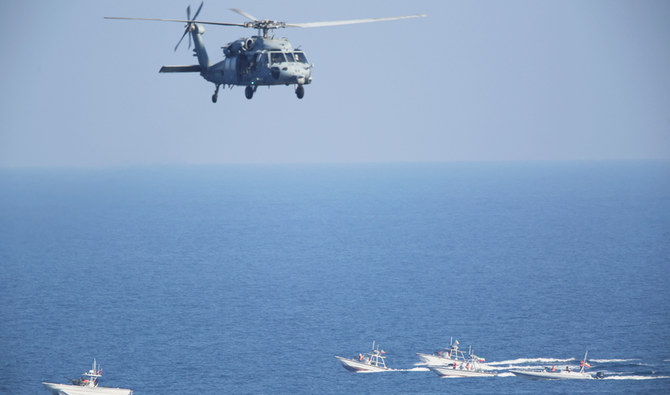DUBAI: The top US Navy official in the Mideast said on Sunday America has reached an “uneasy deterrence” with Iran after months of regional attacks and seizures at sea, even as tensions remain high between Washington and Tehran over the Islamic Republic’s nuclear program.
Vice Adm. Sam Paparo, who oversees the Navy’s 5th Fleet based in Bahrain, struck an academic tone in comments to the annual Manama Dialogue hosted by the International Institute for Strategic Studies. He described having a “healthy respect” for both Iran’s regular navy and the naval forces of its paramilitary Revolutionary Guard.
“We have achieved an uneasy deterrence. That uneasy deterrence is exacerbated by world events and by events along the way,” the vice admiral said. “But I have found Iranian activity at sea to be cautious and circumspect and respectful, to not risk unnecessary miscalculation or escalation at sea.”
Iran’s mission to the UN did not immediately respond to a request for comment.
While Iran has not directly seized or targeted a tanker in recent months, a mine recently struck an oil tanker off Saudi Arabia and a cargo ship near Yemen came under assault. Suspicion immediately fell on Yemen’s Iranian-backed Houthi rebels for being behind both attacks. The Houthis have not commented on either attack.
Paparo, a former Navy fighter pilot who most recently served as director of operations at the US military’s Central Command, offered a different stance than his immediate predecessor, Vice Adm. James Malloy. In one of his last comments to journalists in August, Malloy referred to Iran as “reckless and provocative” and always trying in dramatic naval drills to “lower the denominator until they’re sure that they can look like they’ve won something.”
HIGHLIGHT
While Iran has not directly seized or targeted a tanker in recent months, a mine recently struck an oil tanker off Saudi Arabia and a cargo ship near Yemen came under assault. Suspicion immediately fell on Iranian-backed Houthi rebels for being behind both attacks.
Malloy’s tenure saw oil tankers seized by Iran and a series of limpet mine explosions targeting tankers that the Navy blamed on Iran. Tehran denied being involved, though Revolutionary Guard members were filmed taking an unexploded mine away from one tanker.
By contrast, the several months that Paparo’s been in charge have not seen any major crises.
The US Navy routinely has tense encounters with the Revolutionary Guard, whose speed boats race alongside American warships in the Arabian Gulf and sometimes conduct live-fire drills with machine guns and missile launches in their presence.
The Guard typically patrols the shallower waters of the Arabian Gulf and its narrow mouth, the Strait of Hormuz. Iran’s regular navy largely operates in the Gulf of Oman and the Arabian Sea. While previous commanders have made a point to differentiate between the professionalism of the two, Paparo dismissed it as an “old idea” that included a lingering belief that the service was still loyal to Iran’s former shah, who was toppled in the 1979 Islamic revolution.
“Forty-one years into the revolution, I think we can dispense with that notion,” the vice admiral said. “I sincerely doubt there’s a difference among them.”
Paparo also said he did not believe the 5th Fleet’s mission would be affected by the Navy potentially reconstituting a 1st Fleet responsible for the Indian Ocean.
Still, Paparo’s remarks carried a clear warning, quoting former US Defense Secretary Jim Mattis at one point.
“Be polite, be professional and have a plan to kill everyone in the room,” he said. “That’s how we conduct ourselves at sea.”
















